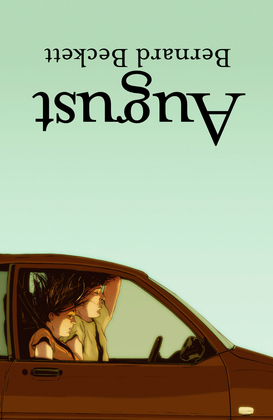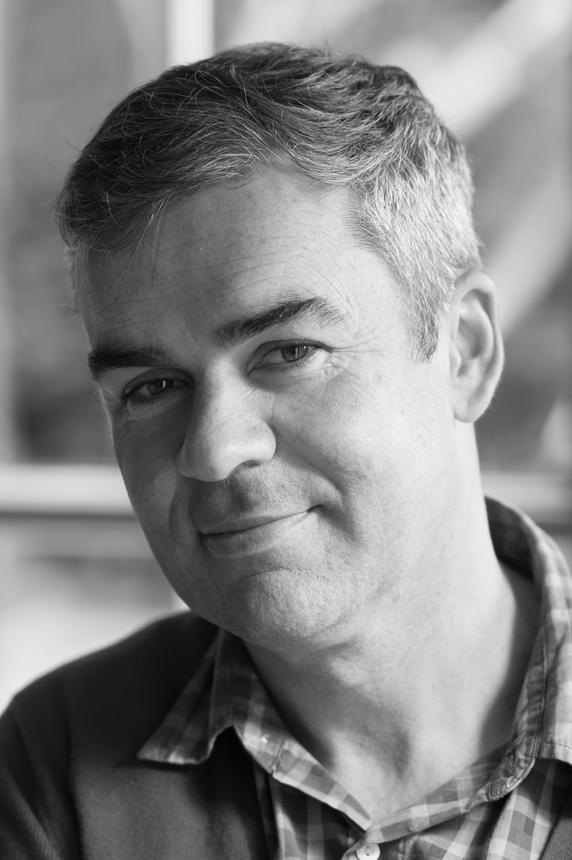Title of the work
Country of the First Edition
Country/countries of popularity
Original Language
First Edition Date
First Edition Details
Bernard Beckett, August. Melbourne: Text Publishing, 2011, 204 pp.
ISBN
Genre
Dystopian fiction
Fiction
Novels
Philosophical fiction
Science fiction
Cover

Courtesy of The Text Publishing Company.
Author of the Entry:
Babette Pütz, Victoria University of Wellington, babette.puetz@vuw.ac.nz
Peer-reviewer of the Entry:
Elizabeth Hale, University of New England, ehale@une.edu.au
Daniel A. Nkemleke, University of Yaounde 1, nkemlekedan@yahoo.com

Portrait of Bernard Beckett. Courtesy of The Text Publishing Company.
Bernard Beckett
, b. 1967
(Author)
Bernard Beckett a New Zealand writer. Born in Featherston and lives in the Wellington region with his wife and three young children. He combines two careers as high school teacher (he teaches English, Drama, Mathematics and Science) in the Wellington region and author. His writing includes several novels (young adult fiction) and dramas. His novels have received a number of prices, including winner and finalist of the NZ Post book award.
Sources:
Profile at the www.bookcouncil.org.nz (accessed: July 4, 2018).
Official website and blog (accessed: July 4, 2018).
Bio prepared by Elizabeth Hale, University of New England, ehale@une.edu.au and Babette Pütz, Victoria University of Wellington, babette.puetz@vuw.ac.nz
Adaptations
Beckett is working on a screenplay based on August with an UK director.
Summary
This novel is the middle volume of a trilogy together with Genesis and Lullaby. It is set in what reminds one of a mediaeval walled city, under the rule of a powerful and oppressive church, but with some modern technology (such as cars). In this two class society the group of the “people of the night” are suppressed, as they allegedly lack a soul. They only enter the city at night, do manual labour and look for scraps of food to eat.
In this novel, the teenagers Tristan and Grace, badly injured and in pain, tell each other their stories after their car crashed and partly tumbled down a cliff, hanging upside down, in the dark. Tristan and Grace do not know if anyone will be able to see and rescue them in daylight nor if they will survive or not. The facts that they are hanging upside down, and the ways in which their worlds were turned upside down, are nicely reflected in the way the book is printed: the entry pages are upside down and you need to turn the pages from right to left.
Tristan used to attend a boys’ church school, St Augustine’s, in which the students are trained in philosophical enquiry through interrogation classes. Because of his intelligence and strong will, the rector decides to use him in a cruel experiment regarding the nature of free will. He asks Tristan to draw a sketch of a girl of the people of the night. Tristan is intrigued by the beauty of the girl’s body and, seeing the fear in her eyes, realises that the church has been lying about the lack of souls in the people of the night. Another brother, sent by the rector, takes Tristan into town at night where he witnesses a passing, i.e. a ceremony of the people of the night in which mothers give the dead bodies of their babies away, not having access to any of the rituals and consolations the church offers its followers. One of the despairing mothers is consoled by a young woman (whom he later finds out to be Grace). They look at each other, Grace thinking he is an angel and Tristan falling in love with her.
As a punishment for leaving school at night, Tristan is locked away in a room in the monastery for two years and has to undergo a number of tests and experiments. The rector has told him that he wishes to use Tristan to prove that every action is predictable, thus there is no free will. Tristan spends the two years training himself through meditation to choose not the choice he would normally take, but another one.
After two years, he faces the final challenge. He and two boys of the night are put into the same room and instructed to complete a complicated puzzle. Whichever boy puts in the very last piece of the puzzle is the winner. The prizes are highly motivating for all three: Tristan’s prize is that he will be brought to Grace and given papers to leave the city, the other two boys would get the chance to escape their lives as people of the night. Tristan wins and is brought to Grace’s house. Looking through her window, he sees her with another man. Terribly upset, he leaves the city without her for the heathen settlements, where he lives with a group of homeless until their leader dies, who is Tristan’s friend.
Grace tells her story of growing up in a convent, losing her best friend (and blaming herself for it) and helping the people of the night at their passing ceremony until she is discovered and expelled from the convent. She would have died outside the convent, alone and helpless in the freezing cold City, had not Mary, one of the women whom she had consoled after her child died, and her husband Anthony, taken her in. In order to help pay for her keep, Grace starts to work as a prostitute. When she is alone in the house with Anthony, he expects to have sex with her and she flees. Before Anthony entered her room that night, she noticed Tristan in the street, looking up at her window, and thought her angel had returned and wanted her to follow him. However, when she flees the house after the encounter with Anthony, Tristan is gone. Grace leaves the city for the heathen settlements, just like Tristan, and it so happens that Tristan sees her there. He steals a car, picks up Grace and causes the terrible car crash.
Eventually, when dawn breaks, Tristan confesses to Grace that he is so obsessed with proving the rector wrong and demonstrating the existence of free will that he wants to do the opposite of what he really wants to do and kill Grace. He starts to choke her, but she proves to him the pointlessness of his argumentation. In the end, in a final and decisive act of free will, the two of them rock the car to make it fall down the cliff further, hoping to be more visible to possible rescuers, but also risking death.
Analysis
The main topic of this novel, the question of free will, is an intriguing topic for human beings, in particular young adults and teenagers. Fittingly, as this topic is central to St Augustine’s work, Tristan is educated in a school called St Augustine’s in which the boys are taught according to St Augustine’s view that the best teaching is through vigorous intellectual dialogues. (Augustine himself was exceptionally skilled in rhetoric.) The school’s rector becomes obsessed with the question of free will and uses Tristan to try to demonstrate that no free will exists. In a battle of wills, Tristan tries to prove him wrong. In the end, it is Grace, who never had the luxury of formal education of the kind that Tristan has had, who teaches Tristan in which ways he was tricked by the rector and that he needs to let go of his obsession to defeat the rector. The name Grace seems also to be chosen in reference to Augustine of Hippo, who repeatedly comments on the necessity of divine grace for humans. Also, the question of the soul and of a hierarchy of beings or even predestination (or possibly double predestination – this is debated among theologians) is discussed in Augustine’s work and reflected in the two class world of this novel, with the people of the night being seen as soulless lower beings. In Tristan’s world, Plato is the main philosopher, together with his prophets Jesus and Augustine. There are some references to Plato’s Theory of Idea/Forms and the Bible.
In short, August is an example of the use of canonical philosophy as it connects with the concerns of young people. The incorporation of Augustine’s philosophy into a dystopian young adult novel adds a sense of intellectual rigour, and provides a framework for young readers’ questions about the world.
Further Reading
There are only a few reviews of this novel. Beckett is one of the authors treated in the following work, which, however, appeared in the same year as August.
Jackson, A. et al., A Made Up Place: New Zealand in Young Adult Fiction, Wellington: Victoria University Press, 2011.


